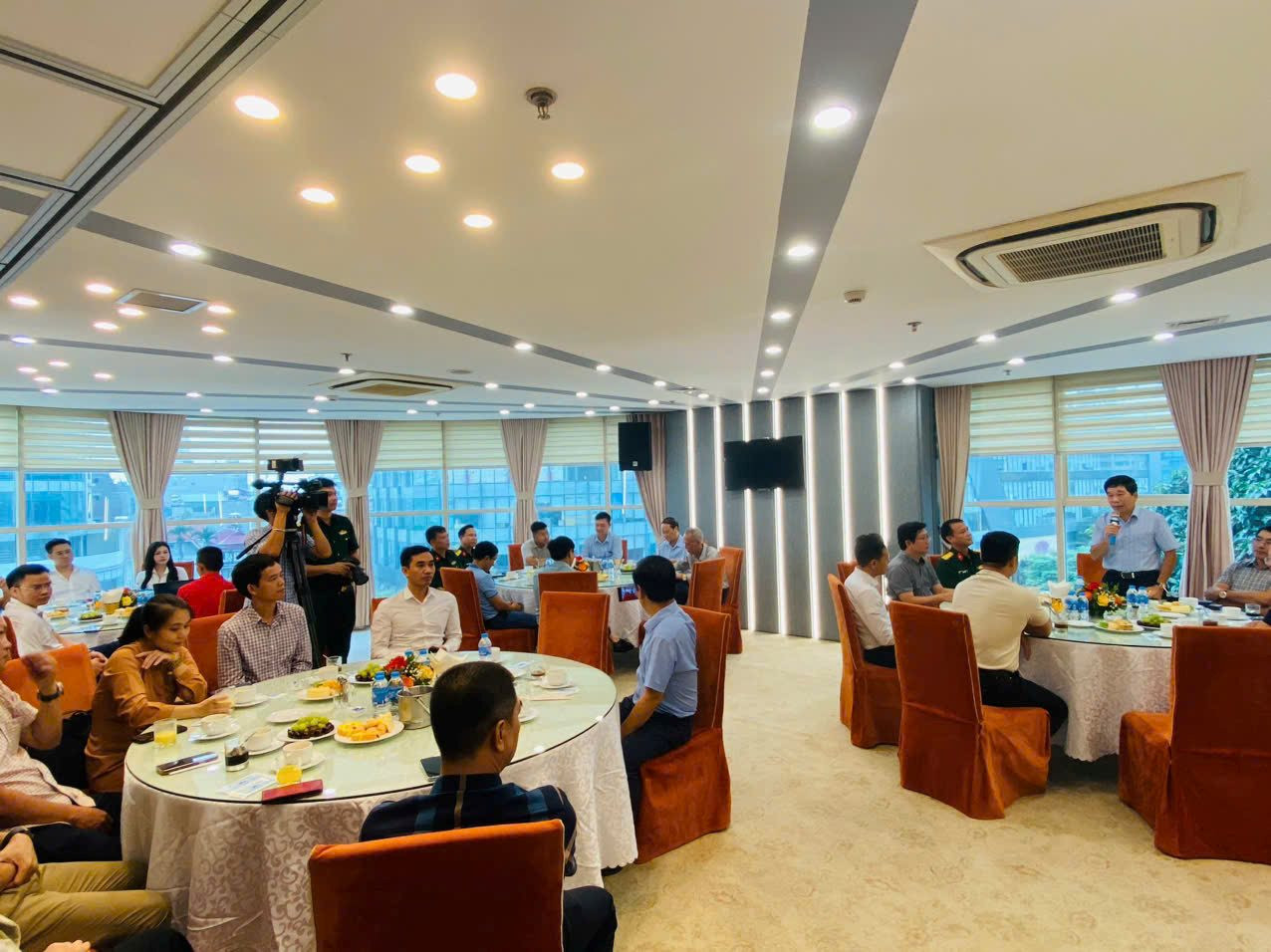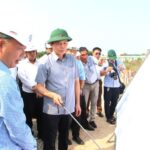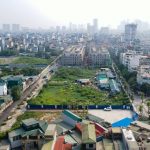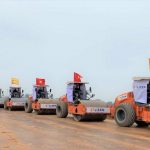
A bird’s-eye view of the Construction Contractors Cafe.
Kicking off the event, Mr. Nguyen Quoc Hiep, Chairman of the Vietnam Association of Construction Contractors, shared that the Ministry of Construction has recently passed Circular 12, which adjusts 850 unit prices for both transportation and construction. According to the Ministry’s assessment, this circular could resolve up to 80% of the problematic unit prices. Mr. Hiep considers this a very positive signal for the construction industry, as most enterprises rely on unit prices to survive, and not adhering to them would result in losses.
Moving forward, the Ministry will continue discussions on Circular 13, which focuses on adjusting labor norms, closely linked to labor unit prices. Therefore, Mr. Hiep believes that the Association’s two proposals to the Prime Minister will be almost entirely addressed, if not entirely, then to a significant degree.
On the topic of tax policies, the Chairman of VACC revealed that on September 14th, the Association will be invited by the National Assembly’s Finance and Budget Committee and the Ministry of Finance to attend a meeting to provide feedback on corporate income tax. The upcoming Corporate Income Tax Law is expected to introduce adjustments favoring small and medium-sized enterprises, with the lowest tax rate expected to drop to 15%, and a second tier at 17% exclusively for small businesses.
As such, VACC aims to gather insights from its members to define what constitutes a small business. Up until now, the classification of small businesses has been based on revenue. However, VACC believes that the true revenue of construction enterprises lies only in labor and management fees.
Through this Contractors Cafe, Mr. Hiep hopes that member units will actively contribute their opinions and perspectives, allowing VACC to build a strong case for its proposals to the Prime Minister, the Ministry of Planning and Investment, the Ministry of Construction, and other relevant organizations.
As a contractor primarily focused on transportation, Lieutenant Colonel Nguyen Tuan Anh, Deputy General Director of Truong Son Construction Corporation, shared his thoughts on the pressing issues in the transportation sector. One key focus is the development of expressways, in line with the Prime Minister’s directives. Specifically, during the 13th session, the Prime Minister chaired a launch event for “500 Days and Nights” to complete 3,000km of expressways by 2025. To achieve this goal, 1,172km remain to be constructed—a significant undertaking.
While many challenges were addressed in the first phase, some issues persist. Out of the Prime Minister’s directives, six remain unaccomplished, all related to revisions and supplements to basic construction norms, including both civil and transportation projects.
The transportation sector has promptly supplemented 14 new norms with a significant impact on contractors. Notably, the Ministry of Construction recently held a meeting and passed Circular 12 on construction norms, a significant victory for contractors.
“Circular 13 remains complex. We need to address the issue of labor norms; the labor rate in the norms cannot remain this low. The labor weightage is also very low. While we’ve made progress on unit prices, we still need to provide clearer insights on labor norms,” emphasized Mr. Tuan Anh.
Additionally, Mr. Tuan Anh shared that some projects in Central and Southern Vietnam face limitations and shortages of materials. Recently, the National Assembly passed Resolution 44, followed by Resolution 106, allowing contractors to exploit these materials through a special mechanism. However, Mr. Tuan Anh believes this only solves the issue of ensuring progress, as reimbursement and accounting for contractors remain challenging due to post-inspection risks.
In summary, determining costs, norms, material calculations, and local taxes remains confusing, with each locality having its own approach, lacking uniformity. Another perennial issue in transportation is land clearance, which will significantly hinder contractors and further stall capital.
Moreover, Mr. Tuan Anh observed that competitive bidding is becoming increasingly cutthroat, not only among small contractors but also involving large and reputable enterprises, with “big fish eating small fish.” It’s time to re-evaluate and address the situation, as continuing the trend of reputable and small contractors bidding low prices to avoid unhealthy competition will eventually lead to their demise.
Lieutenant Colonel Phan Phu, Chairman of Corporation 319, expressed his agreement with Circular 12, finding it practical. However, he noted that after this circular, there is a need for specific guidance on special payment mechanisms for mine allocation. Currently, enterprises working on expressways are facing cash flow issues. Corporation 319 aims to complete its expressway project six months ahead of schedule, and while it has finished the subgrade work, only 70% of the contract value has been paid. Cash flow is challenging because contractors’ revenue primarily comes from a small portion of labor costs.
The units also face difficulties with land clearance costs for material mines (not within the area subject to recovery) and are left to negotiate with the people themselves, leading to significantly higher costs. To secure materials for the project, they have no choice but to accept these terms. Therefore, it is proposed that when deciding to exploit a mine, that mine should be recovered immediately.
Regarding norms, Lieutenant Colonel Phan Phu suggested hiring an independent unit to determine prices using the “realistic and punctual” method while maintaining state management and reporting. Many unit prices currently lack practicality.
Another critical issue is the low cost norms for survey design, which impacts contractors’ effectiveness and legal risks. These cost norms must be given more importance. If these costs were more reasonable, they would ensure benefits and project effectiveness, emphasized Mr. Phu.
Additionally, Lieutenant Colonel Phan Phu proposed that the Association organize an event inviting enterprises to discuss fair competition and anti-dumping.
A representative from Hoa Binh Construction Corporation also attended and shared their thoughts, stating that overdue payments are a chronic issue in the construction industry. Cash flow is the lifeblood of enterprises, mainly relying on bank loans. Therefore, it is proposed that relevant agencies be urged to legislate and establish mechanisms to hold responsible parties accountable for payments and provide guarantees for payment assurance.
In the last 4-5 years, the construction industry has not seen any new advancements in technology or processes, with 90% of the focus on financial concerns and only 10% on professional work. Only in dire situations do contractors resort to legal action.
Additionally, the Hoa Binh representative proposed organizing another event involving banks and large construction enterprises to provide special support and mechanisms for reputable, long-standing enterprises.
Mr. Bui Khac Son, Chairman of Xuan Mai Construction and Investment Joint Stock Company, suggested re-evaluating state management for any obstacles. Each enterprise should find its key market. Regarding corporate culture, it is essential to foster a healthy construction market with strong connections between contractors.
Mr. Nguyen Khac Hai, Deputy General Director of Vietnam Export-Import and Construction Joint Stock Company, shared his perspective on ensuring that policies are practical and closely aligned with reality. Challenges should be addressed concretely, and corporate culture in the construction industry should be specific, quantifiable, and standardized.
Mr. Nguyen The Manh, Chairman of the Hai Phong Construction Contractors Association, offered his insights, sharing that the Hai Phong Construction Contractors Association comprises nearly 300 corporations and companies operating in construction and building materials.
Mr. Manh expressed interest in the measures and collaborative initiatives among the members of the Vietnam Association of Construction Contractors. He looked forward to hearing the contributions and perspectives of large corporations and companies to facilitate the sharing and connection of significant projects among members. The Hai Phong Construction Contractors Association aims to function as a large corporation, leveraging its human resources and economic strengths to accompany corporations and complete projects in Hai Phong and nationwide.
“We very much look forward to accompanying the Vietnam Association of Construction Contractors in building a prosperous, wealthy, and powerful Hai Phong and Vietnam,” said Mr. Manh.
Mr. Duong Van Can, VACC Secretary-General, also shared some new provisions related to Laws, Circulars, and Decrees in bidding, construction, and soon-to-be-completed cultural documents for construction contractors. He invited member units to provide feedback and revisions, expected to be issued by the end of 2024.
Concluding the event, VACC Chairman Nguyen Quoc Hiep affirmed that the Association would consolidate the proposals made during the workshop into a document. He also requested that the units sign directly to increase the impact and value of the construction contractors’ community’s proposals to the Prime Minister and state management agencies.
The most extensive bribery case ever in Thanh Hoa: Numerous suspects prosecuted for “Giving and Receiving Bribes”
The Provincial Security Investigation Agency (PSIA) of Thanh Hoa province announced on January 31st that it has made the decision to initiate a prosecution against 23 individuals in connection with the offenses of “Accepting bribes” and “Giving bribes” as stipulated in Article 354(3) and Article 364(2) of the Criminal Code.
High-speed Fever from Bien Hoa to Vung Tau through Dong Nai Province
After 7 months of construction, the Biên Hòa-Dồng Nai expressway project is still facing challenges with land clearance.
The Power of Lizen: Consistently Winning Massive Bids
Lizen has achieved a significant milestone by successfully deploying and implementing major high-speed construction projects in 2023. The company’s revenue has reached 2,030.5 billion VND, which is twice the amount compared to 2022. However, the post-tax profit has reached its lowest point in the past 6 years, dropping down to only 118.3 billion VND.




















